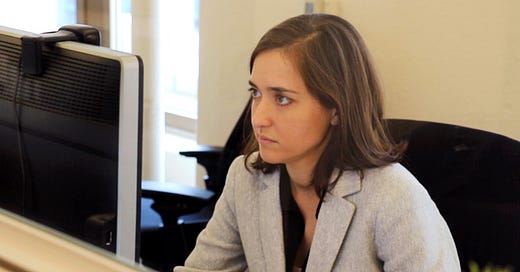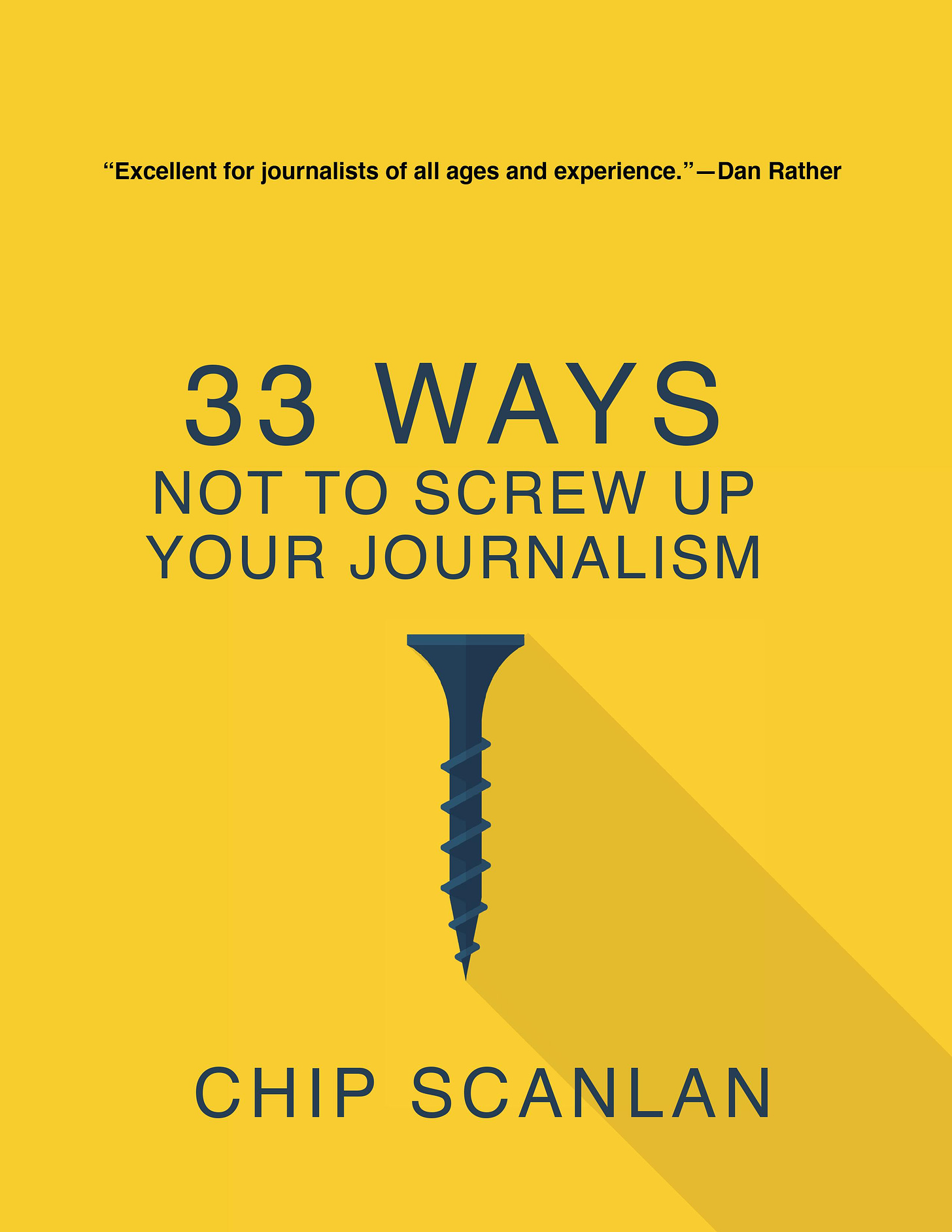Writers Speak | James Baldwin on the importance of the writer
Interview | 4 Questions with Alexandra Zayas
Craft Lesson | Adjust your attitude
Book World | Pre-launch podcast tour
Help Royal Hospitallers save lives in Ukraine
WRITERS SPEAK
“The importance of a writer is continuous; I think it's socially debatable and usually socially not terribly rewarding, but that's not the point; his importance, I think, is that he is here to describe things which other people are too busy to describe.”
- James Baldwin
INTERVIEW | 4 QUESTIONS WITH ALEXANDRA ZAYAS
Alexandra Zayas is a deputy managing editor at ProPublica, running a team of reporters and overseeing senior editors of its global public health and visual storytelling teams. Since joining ProPublica in 2017, stories she edited have won two National Magazine Awards, two George Polk Awards and a Pulitzer Prize for Feature Writing. She worked at the Tampa Bay Times for 12 years, ultimately as the newspaper’s enterprise editor. As a reporter, her investigation into abuse at unlicensed religious children’s homes won the Selden Ring Award for Investigative Reporting and the Livingston Award for Young Journalists and was named a finalist for the Pulitzer Prize for Investigative Reporting. She also teaches investigative journalism at Poynter.
Photo courtesy of The Poynter Institute
What’s the greatest lesson you’ve learned as an editor?
Editing isn’t about fixing the copy in front of you, it’s about squeezing the best possible version of the story out of the universe by helping the writer to see it and capture it. What that help looks like will vary between individuals and fluctuate for the same writer at different points in the process. A big part of the job is removing obstacles, especially those that are self-imposed. One writer may need help seeing the forest for the caveats. Another may need reminders to get inside subjects’ shoes and hearts. Editing is knowing when to stay out of their hair and when to give them a nudge, when to insist they keep pushing for the impossible and when to let them cut bait. It’s making sure they feel comfortable arguing with you and recognizing when they’re right — but also recognizing when, amid a nasty bout of 11th-hour second-guessing, the writer is just tired and hangry; then, you send them a sandwich. You can’t do this job without legitimately loving these people and living for their victories and growth.
What has been the biggest surprise of your editing life?
How different editing is from reporting and writing. An editor is a trusted partner, a blind-spot detector, a high-stakes decision maker, a structural engineer. You do a lot more thinking about what you don’t see, what’s in the negative space: What Achilles’ heel might this premise have? The language is beautiful, but is the logic sound?
If you had to choose a metaphor to describe yourself as an editor, what would it be and why?
A writer once called me Spanx because of the way I compress flabby prose. I hope I’m also like a camera drone that helps you see above the weeds and a construction site boss who knows when the scaffolding can come down.
What is the single best piece of editing advice anyone ever gave you?
Sometimes, you won’t see the perfect path from day one. You might be paralyzed by fear when you open a draft and the next step isn’t obvious. Learn to slow down, talk through the problems with the writer, roll the ball forward and trust the process. (Hat tip to Adam Playford for this great advice, which he likely won’t remember giving.
CRAFT LESSON | ADJUST YOUR ATTITUDE
When I think of the hundreds of journalists I have coached over the years, the best ones impressed me with their intellect and creativity. But what stands out most are not these strengths, important as they may be. Instead, it was their attitude that made them special.
Five decades of working with writers and editors have convinced me that attitude—a way of thinking that is reflected in a person’s behavior—matters more than talent.
Talent may open the door, but attitude gets you inside the room.
Journalism is a craft. It relies on a set of skills: reporting and researching, writing and revision (and more revision), understanding of structure, and facility with language, syntax, and style. Mastery requires years of study, work and above all, patience.
In his book Outliers: The Story of Success, Malcolm Gladwell cited research that found achieving mastery in any field requires 10,000 hours of work. There’s no doubt that becoming a good journalist takes an enormous expenditure of time and effort. “Do the work,” no matter how tedious, was Bryan Gruley’s mantra when he wrote long features for Bloomberg Businessweek magazine and remains now that he’s the author of thriller fiction.
Without the right attitude and the willingness to make that commitment, the chances of success are slim to none.
ATTITUDE PAYS OFF
David Maraniss is a Pulitzer Prize-winning journalist, best-selling author and associate editor of The Washington Post. But what I remember best was what he had to say when I interviewed him after he won a $10,000 American Society of Newspaper Editors award for deadline reporting.
His prize-winning 1996 story—about the return of government officials killed in a plane crash to Dover Air Force Base—was a stunning meditation on fate and loss reported and written in a matter of hours.
The weather was cold and miserable. Maraniss wound up with pneumonia. But he covered the story like an eager intern.
GIVE AND GET
Maraniss often devoted months to investigations and series. But when news broke, he was one of the first to pitch in.
“Usually when there’s some kind of major event happening, I either volunteer to help out, or they ask me,” he told me. “Even if I’m doing a series, I say, ‘Look, if you guys need me, I’d be happy to do something.’ I try to be in a position to say yes…”
“So many reporters keep banging away at their editors and having frustrating confrontations about what they have to do or don’t have to do,” he said. “I’ve always found it much more effective to do what I want to do by doing some things for them. There’s a fair exchange.”
In a field where so much—success and rejection, for starters—is out of a journalist’s hands, attitude is one thing we can control. We can decide whether to offer help, as Maraniss did, to procrastinate or commit to one more revision or learn from others, rather than be consumed by jealousy about their achievements.
AN ATTITUDE CHECKLIST
Attitude makes the difference between giving up and sticking with a story.
Attitude means making one more phone call, writing one more draft, burrowing into your story one more time to refine and polish it.
Attitude means fostering a collaborative relationship with editors rather than a toxic one.
In the end, attitude is what makes the difference between failure and spectacular success.
THE BOOK WORLD | PRE-LAUNCH PODCAST TOUR
It’s official. My new book, 33 Ways Not To Screw Up Your Journalism, will be published June 14 by Networlding Publishing.
The timing was perfect this week to talk up the book on back-to-back appearances on a pair of fantastic podcasts.
First, I preached the power of counterphobia, how to make time to write, and talked about the book that turned a 12-year-old “sneak reader” into an aspiring writer with co-hosts Dan Sterenchuk and Tommy Estlund on the welcoming & wise "Curiosity Hour Podcast." Asking what brings me bliss gave me the chance to talk about my twin passions: my three grandchildren and making meaning with words. It’s a great interview opener that I plan to use in future. What brings you bliss?
Then I had the great fortune to have a return visit to The Creative Nonfiction Podcast, hosted by the uber-prepared and superbly conversational Brendan O’Meara, who reads your book and always asks insightful questions about the writing craft. He generously called 33 Ways Not To Screw Up Your Journalism “a great handbook for reporters of all experiences, skills, and ambitions.” On the episode, learn the true story behind USUCK FM, the radio station for blocked writers, and more here.
Here’s the final book cover, complete with the coveted Dan Rather blurb.
Help Royal Hospitallers save lives in Ukraine
A grateful shout-out to my generous readers. A donation of $400 has been made to Royal Hospitallers, Ukrainian's brave volunteer paramedic battalion, 1/2 of which came from a month's royalties donated from sales of "Writers on Writing," the rest of which I matched. Please continue to help here!
BEFORE YOU GO
If there’s one person you think would benefit from the interviews, craft lessons, writing tips, and more that appear every two weeks in this newsletter, please nominate them to subscribe @ chipscanlan.substack.com
If you’d like to tangibly support Chip’s Writing Lessons and my work, please consider becoming a paid subscriber. Once a week, these members receive an extras package featuring fresh interviews with leading writers and editors, excerpts from my books of writing advice, excerpts from a memoir in progress, more inspirational quotes, coaching tips and more recommended readings and listening options.
Thanks.
NOW AVAILABLE IN PAPERBACK AND EBOOK
Writers on Writing: Inside the lives of 55 distinguished writers and editors
“By asking four questions to 55 of our finest writers and editors, Chip Scanlan has hosted one of the greatest writing conferences you will ever attend." - Roy Peter Clark, The Poynter Institute, “Writing Tools”
"A marvelous book for writers, people who have a passion for writing, or simply, who want to become writers. Yet what strikes me about this book is that it is not just for writers only." The Blogging Owl
AND
Writers on Writing: The Journal
Available on Amazon and through a local independently-owned bookstore @ writersonwritingbooks.com
33 Ways Not To Screw Up Your Journalism (forthcoming Spring 2022_
chipscan@gmail.com | +1-727-366-8119
Thanks for reading. See you in two weeks.




